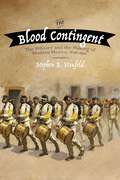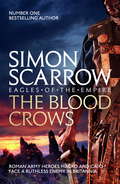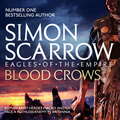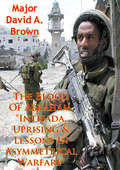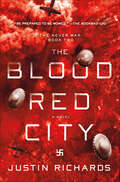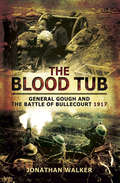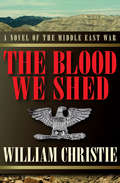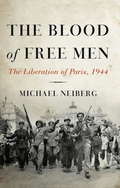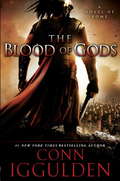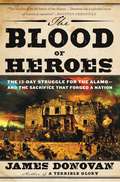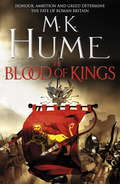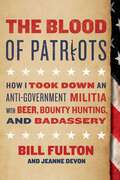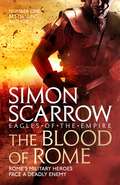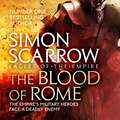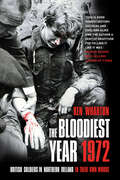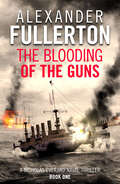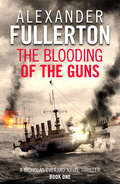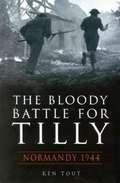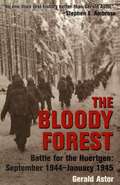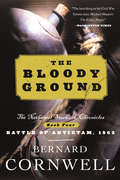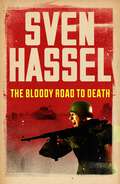- Table View
- List View
The Blood Contingent: The Military and the Making of Modern Mexico, 1876–1911
by Stephen B. NeufeldThis innovative social and cultural history explores the daily lives of the lowest echelons in president Porfirio Díaz&’s army through the decades leading up to the 1910 Revolution. The author shows how life in the barracks—not just combat and drill but also leisure, vice, and intimacy—reveals the basic power relations that made Mexico into a modern society. The Porfirian regime sought to control and direct violence, to impose scientific hygiene and patriotic zeal, and to build an army to rival that of the European powers. The barracks community enacted these objectives in times of war or peace, but never perfectly, and never as expected. The fault lines within the process of creating the ideal army echoed the challenges of constructing an ideal society. This insightful history of life, love, and war in turn-of-the-century Mexico sheds useful light on the troubled state of the Mexican military more than a century later.
The Blood Crows
by Simon ScarrowIF YOU DON'T KNOW SIMON SCARROW, YOU DON'T KNOW ROME!THE BLOOD CROWS is the unputdownable twelfth novel in Simon Scarrow's bestselling Eagles of the Empire series. A must read for fans of Bernard Cornwell. Praise for Simon Scarrow's gripping novels: 'Ferocious and compelling' Daily Express Britannia, AD 51. For nearly a decade, the Roman Empire has fought to assert its hold over Britannia. But relentless opposition from native tribes led by the fanatical King Caratacus threatens to destroy everything.Prefect Cato and Centurion Macro are dispatched from Rome to aid the campaign. Placed in command of an outpost in the remote western mountains, they face a challenge even more deadly than the unremitting attacks of barbarian forces. For they must wrench control of the fort from Centurion Quertus, a man who wages a savage personal war and inspires a loyalty in his men above their bond with Rome. With dangerous enemies on both sides, Cato and Macro face the fight of their lives to bring peace to the most perilous frontier in Europe.
The Blood Crows
by Simon ScarrowIF YOU DON'T KNOW SIMON SCARROW, YOU DON'T KNOW ROME!THE BLOOD CROWS is the unputdownable twelfth novel in Simon Scarrow's bestselling Eagles of the Empire series. A must read for fans of Bernard Cornwell. Praise for Simon Scarrow's gripping novels: 'Ferocious and compelling' Daily Express Britannia, AD 51. For nearly a decade, the Roman Empire has fought to assert its hold over Britannia. But relentless opposition from native tribes led by the fanatical King Caratacus threatens to destroy everything.Prefect Cato and Centurion Macro are dispatched from Rome to aid the campaign. Placed in command of an outpost in the remote western mountains, they face a challenge even more deadly than the unremitting attacks of barbarian forces. For they must wrench control of the fort from Centurion Quertus, a man who wages a savage personal war and inspires a loyalty in his men above their bond with Rome. With dangerous enemies on both sides, Cato and Macro face the fight of their lives to bring peace to the most perilous frontier in Europe.
The Blood Crows: Cato & Macro: Book 12
by Simon ScarrowIF YOU DON'T KNOW SIMON SCARROW, YOU DON'T KNOW ROME!THE BLOOD CROWS is the unputdownable twelfth novel in Simon Scarrow's bestselling Eagles of the Empire series. A must read for fans of Bernard Cornwell. Praise for Simon Scarrow's gripping novels: 'Ferocious and compelling' Daily Express Britannia, AD 51. For nearly a decade, the Roman Empire has fought to assert its hold over Britannia. But relentless opposition from native tribes led by the fanatical King Caratacus threatens to destroy everything.Prefect Cato and Centurion Macro are dispatched from Rome to aid the campaign. Placed in command of an outpost in the remote western mountains, they face a challenge even more deadly than the unremitting attacks of barbarian forces. For they must wrench control of the fort from Centurion Quertus, a man who wages a savage personal war and inspires a loyalty in his men above their bond with Rome. With dangerous enemies on both sides, Cato and Macro face the fight of their lives to bring peace to the most perilous frontier in Europe.(P)2013 Headline Publishing Group Ltd.
The Blood Of Abraham, “Intifada, Uprising & Lessons In Asymmetrical Warfare”
by Major David A. BrownA historical case study concerning the Israeli Army's response to the Palestinian "Intifada" or uprising in the late 1980's and early 1990's provides instructive planning considerations for likely future application of U.S. military force in an asymmetrical threat environment. The monograph specifically analyzes the time period from the beginning of the uprising until the handshake of Rabin and Arafat on the White House lawn September 13th, 1993.Although the theoretical application of the case study is speculative of future environments, this paper attempts to link available historical data to anticipated trends in the international security environment and emerging concepts of operational art. The argument surrounding asymmetrical types of warfare leads into a discussion of the application of IDF lessons learned that may be applied to future U.S. military scenarios.
The Blood Red City: A Novel (The Never War)
by Justin RichardsThe alien Vril are waking, and the Never War is heating up. Colonel Brinkman and his team at Station Z desperately need answers - they have to discover exactly what they are facing and how the attack will come. But the information doesn't come easily. With a major Vril offensive imminent, the Nazis step up their own project to exploit Vril weapons and technology.Leo Davenport finds himself fighting with the Greek resistance as he struggles to solve an ancient mystery. Major Guy Pentecross must travel to the ruined deathtrap of the most dangerous city in the world to track down the one man who can help.From a spaceship crash in Bavaria in 1934 to the rat-infested devastation of Stalingrad, from the ancient ruins of occupied Greece to the bombed-out streets of London, the second book of the Never War series continues a secret history of the Second World War in which humanity itself is fighting for survival...This is Indiana Jones crossed with The X-Files. In TheBlood Red City, Justin Richards has an extremely credible grasp of the period's history and has transformed it into a groundbreaking alternate reality thriller.
The Blood Tub: General Gough and the Battle of Bullecourt 1917
by Jonathan WalkerThis controversial and stirring account of one of the bloodiest battles of the Great War recounts a heroic but disastrous engagement which left a lasting rift between the British and Australians. Drawing from a wealth of unpublished sources and eyewitness accounts, Jonathan Walker's study of the Battle of Bullecourt is vital to an understanding of the difficulties that faced Great War commanders. Central to The Blood Tub is a reassessment of Sir Hubert Gough, one of the Great War's most colourful generals.In the late spring of 1917, the Allies attacked at Arras, and a combined British and Australian force under General 'Thruster' Gough assaulted the fortress village of Bullecourt. Despite using the new wonder weapon, the tank, Gough's first attack ended in disaster and bitter recriminations. He then launched a second massive attack. For the next two weeks, the Battle of Bullecourt dominated British offensive action on the Western Front. It was the excessive brutality and ferocity of the hand-to-hand fighting that earned Bullecourt the name 'Blood Tub.'
The Blood We Shed: A Novel of the Middle East War
by William ChristieIn this novel by a Marine Corps veteran, a young lieutenant takes command of an unruly platoon just as the chaos of 9/11 sends them into the War on Terror. The United States Marine Corps is a legendary fighting force. Literally thousands of books and movies have glorified its history. But now a Marine veteran has written a novel that opens up the curtain and provides a look deep inside the modern Corps: the good, the bad, and the sometimes just plain embarrassing. Lieutenant Mike Galway takes command of his first platoon and it is not at all what he bargained for. What he anticipated was the challenge of training a unit of disciplined Marine infantrymen to go to war. Instead he finds himself responsible for a group of unruly American teenagers, for whom he has to become a combination of surrogate father, psychologist, high school principal, marriage counselor, financial advisor, conflict mediator, and drug and alcohol therapist. The results are frequently hilarious, always frustrating, and sometimes heartbreakingly tragic. While Galway learns the secrets of leadership he and his men are overtaken by the events of September 11, 2001, and the time for playing war is over. Now at the place where Marines always expect to be, the tip of the spear, the men of Echo company deploy aboard ship and race towards the Middle East. There they find themselves fighting the first battle of a war that continues to this day, in a place none of them could expect.
The Blood of Free Men: The Liberation of Paris, 1944
by Michael NeibergIn "The Blood of Free Men," acclaimed historian Michael S. Neiberg provides a thrilling new history of the Liberation of Paris, showing how a host of brave fighters, commanders, and officials saved the city and, in the process, shaped the outcome of World War II. The Liberation of Paris was a chaotic, complex operation that could have easily ended in the cityOCOs ruin. Paris was only spared from being turned into a rubble-heap thanks to the efforts of a complex network of players, some of whom seemed to be working against each other. While the Allied Forces largely ignored Paris (focusing instead on reaching Germany), the French themselves were deeply divided. French political cells competed for control of the Resistance within Paris. Outside the city, Charles de Gaulle and his Free French Forces aimed to direct the Resistance and establish themselves at the head of France upon its liberation. Determined to stop these fragmented forces was the occupying German army, which clung to Paris with ever more ferocity as the Allied army approached from its Normandy beachhead. As Neiberg demonstrates, the Germans were at first far more concerned with ParisOCOs well-being than were the Allies. Paris had been a relatively minor strategic priority for the Allies in the broader scope of the war, but as a major transportation hub for German troops and materiel in the region the city was critical to GermanyOCOs stranglehold on France. German commanders knew that, in order to move their forces freely within those parts of western Europe still under Axis control, they would have to keep Paris intact and in order for as long as possible. Many French citizens had themselves been content to forego outright confrontation with the occupiers in favor of city-wide stability; most Parisians lived alongside German troops in relative peace for the early years of the war. But that fa ade was broken by the time the Allies flooded into Normandy. Hammered by deadly Allied bombing raids and starved by food shortages (which were only exacerbated by the appetites of German troops), many ordinary Frenchmen decided to act. Electrified by news gleaned furtively from the BBC, Parisians began to stand up to the Germans. ParisOCOs policemen, many of them also Resistance members, stopped enforcing the GermansOCO repressive laws, forcing the SS and Gestapo to do their dirty work themselves. Tensions finally boiled over on August 19, when a group of brave ParisiansOComostly policemen and Resistance fightersOCofaced off against their occupiers. It was a dangerous gambit, as Hitler had ordered the cityOCOs military leadership to destroy Paris rather than let it fall. Indeed, Neiberg reveals that, contrary to popular conceptions (which hold that Dietrich von Choltitz, the cityOCOs military governor, had never intended to obey HitlerOCOs orders), the mounting chaos may have actually have led to the cityOCOs demolition. Tragedy was only averted by the intervention of Swedish Consul General Raul Nordling. Neiberg shows how the oft-overlooked Nordling brokered a ceasefire with von Choltitz, buying the Allies the time they needed to make it to the cityOCoand thereby saving Paris from the fate Hitler had planned for it. Tracking the movements of entire armies as well as the machinations of individuals on the ground, "The Blood of Free Men" provides an arresting narrative of the Liberation, as well as an authoritative explanation of its place in the scope of World War II and in French history at large. Gripping, fast-paced, and populated with unforgettable characters, it tells the full story of one of the warOCOs defining moments, when a tortured city and its inhabitants stood up to reclaim their liberty.
The Blood of Gods
by Conn IgguldenThis eBook edition features exclusive bonus content, Conn Iggulden's original short story "Fig Tree."One of history's most notorious assassinations sets the stage for a riveting tale of political intrigue, epic battle, and righteous retribution in a new novel of ancient Rome from #1 New York Times bestselling author Conn Iggulden. THE BLOOD OF GODS Julius Caesar has been cut down. His blood stains the hands of a cabal of bold conspirators, led by famed general Marcus Brutus--whom Caesar once called a friend. Have these self-proclaimed liberators bravely slain a power-mad tyrant or brutally murdered the beloved Father of Rome? Hailed as heroes by a complicit Senate and granted amnesty, the killers eagerly turn toward plotting the empire's future under their control. But Caesar's death does not rest easily with all of Rome. For two men whose bonds of friendship, family, and fidelity to the emperor are unbreakable, the shocking assassination is nothing less than treason. And those responsible must pay with their lives. Through countless battles and years of peace, Marc Antony has wielded a sword and raised a cup at Caesar's side. Now, in the wake of the cold-blooded coup, he is powerless against the political might of Brutus and his treacherous senators. Yet with no weapons other than eloquence and outrage, Antony will turn the tide of public opinion and spark a rebellion that will set the streets of Rome ablaze. At the same time, Gaius Octavian, adopted son and chosen heir of Caesar, has gained wealth and influence beyond imagining. But the soul-deep wound of his father's death will never be healed by gold or power. He will rest only with the blood of the killers on his blade. Drawn together by their common cause, Antony and Octavian marshal their forces into an avenging army on a mission to reunite all that Caesar's fall has torn asunder. Even as his cohorts flee for their lives--or fall prey to vigilantes--a defiant Brutus vows never to relinquish what his ruthless ambition has won him. As opposing legions join in mortal combat, the destiny of Rome will turn on which of their commanders is the mightiest and most cunning. Marking the author's triumphant return to the setting of his celebrated Emperor series, The Blood of Gods unfolds with unmatched power, electric with the high-adventure storytelling, captivating historical detail, and stirring battle scenes for which Conn Iggulden is renowned.Praise for Conn Iggulden's Empire series "Dramatic historical fiction to keep adults turning pages like enthralled kids . . . [Iggulden] is a grand storyteller. . . . A spirited, entertaining read."--USA Today "Exhilarating . . . Words like 'brilliant,' 'sumptuous' and 'enchanting' jostle to be used, but scarcely convey the way Iggulden brings the schoolbook tale to life, or the compelling depictions of battle, treachery and everyday detail in a precarious world well lost but vividly re-created."--Los Angeles Times "What Robert Graves did for Claudius, Conn Iggulden now does for the most famous Roman emperor of them all--Julius Caesar."--William Bernhardt, author of Criminal Intent "[Iggulden] excels at describing battle scenes both small-scale and epic."--The Seattle Times "Utterly marvelous . . . Solid research and a real knack for character development bring [Julius Caesar] to life in a truly magical, electrifying way."--The Telegram (St. John's, Newfoundland)
The Blood of Heroes: The 13-day Struggle for the Alamo -- and the Sacrifice That Forged a Nation
by James DonovanOn February 23, 1836, a large Mexican army led by dictator Santa Anna reached San Antonio and laid siege to about 175 Texas rebels holed up in the Alamo. The Texans refused to surrender for nearly two weeks until almost 2,000 Mexican troops unleashed a final assault. The defenders fought valiantly-for their lives and for a free and independent Texas-but in the end, they were all slaughtered. Their ultimate sacrifice inspired the rallying cry "Remember the Alamo!" and eventual triumph.Exhaustively researched, and drawing upon fresh primary sources in U.S. and Mexican archives, THE BLOOD OF HEROES is the definitive account of this epic battle. Populated by larger-than-life characters--including Davy Crockett, James Bowie, William Barret Travis--this is a stirring story of audacity, valor, and redemption.
The Blood of Kings: A historical thriller of bravery and bloodshed (Tintagel)
by M. K. HumeHonour, ambition and greed determine the fate of Roman Britain... Flavius Magnus Maximus has cast his eyes on the throne of the Emperor of Rome and nothing will stand in his way... The Blood of Kings, part one of the Tintagel trilogy, is the perfect read for fans of George R.R. Martin and Simon Scarrow. 'Hume deftly navigates the Arthurian legends, populating them with likable and despicable characters, and casting them in a fully realized historical setting' - Publishers WeeklyThe fate of Roman Britain is sealed when Caradoc, King of the Dumnonii tribe in Tintagel, meets Flavius Magnus Maximus, one of the most influential Roman officers in Britannia. Their unlikely friendship leads to an ambitious plan to unite the tribal leaders and, once crowned the first High King of the Britons, Maximus casts his eyes on the throne of the Western Roman Empire.Leading a force of brave warriors to Gaul, Maximus is victorious in battle. But it is not long after his return to Britain that hubris gnaws at him once again. Despite Caradoc's pleas to exercise caution, Maximus is determined to march on Rome itself. But who will pay the price for his bloodthirsty quest for power?What readers are saying about The Blood of Kings: 'A gripping story with bloody battles and with great interaction, brought to us in a most exciting fashion''M.K. Hume brings not only her characters to life but also the sights and sounds of battle''Well written, has cracking prose and of course a storyline that is hard to put down'
The Blood of Patriots: How I Took Down an Anti-Government Militia with Beer, Bounty Hunting, and Badassery
by Jeanne Devon Bill FultonWhen Bill Fulton arrived in Alaska, he was filled with optimism and big dreams. When he left, it was under FBI escort. Bill was Army Infantry. When his knees gave out, he opened the Drop Zone, a military surplus store in Anchorage, and started hiring fellow vets. Sharpshooting hippies, crew-cutted fundamentalists, PTSD sufferers—all seeking purpose and direction. Alaska gave it to them. The Last Frontier is vast. The perfect refuge for fugitives and the perfect place for vets itching for a mission, Alaska is a giant icebox full of people either running to or away from something. More than 400 fugitives would meet Bill and company on the wrong side of a gun, and he would learn many lessons along the way—like even tiptoeing through subzero snow can get you shot, and removing a gun from the butt crack of a 300-pound man is just as fun as it sounds. Bill was enjoying the ride until, one day, the FBI asked him to go undercover, and his road forked. Schaeffer Cox was a sovereign citizen who believed no government had authority over him and a private militia commander amassing an arsenal and plotting to kill judges and law enforcement officers. Bill's mission: to take down Cox and his militia without a shot being fired. The Blood of Patriots traverses a wide swath of rugged territory. Raucously funny and stark, it depicts men, once brothers in arms serving their country, who now find themselves on opposite sides of those arms in a deadly test of the intricacies of liberty, the proper role of government, and the true meaning of patriotism. It offers a witty and unsettling look at political rhetoric gone haywire and a movement the FBI considers the single greatest threat to law enforcement in the nation—all set in the beautiful, terrifying landscape of our 49th State.
The Blood of Rome (Eagles of the Empire 17)
by Simon ScarrowDon't miss the next epic novel in the Eagles of the Empire series - TRAITORS OF ROME is out on 14th November 2019, and available for pre-order now!THE SUNDAY TIMES BESTSELLERThe gripping and action-packed new adventure in Simon Scarrow's bestselling Eagles of the Empire series, not to be missed by readers of Conn Iggulden and Bernard Cornwell. It is AD 55. As trouble brews on the eastern fringes of the Roman Empire, Prefect Cato and Centurion Macro prepare for war... The wily Parthian Empire has invaded Roman-ruled Armenia, ousting King Rhadamistus. The King is ambitious and ruthless, but he is loyal to Rome. General Corbulo must restore him to power, while also readying the troops for war with Parthia. Corbulo welcomes new arrivals Cato and Macro, experienced soldiers who know how to knock into shape an undermanned unit of men ill-equipped for conflict.But Rhadamistus's brutality towards those who ousted him will spark an uprising which will test the bravery of the Roman army to the limit. While the enemy watches from over the border...Praise for Scarrow's bestselling novels: 'Blood, gore, political intrigue... A historical fiction thriller that'll have you reaching for your gladius' Daily SportWhat readers are saying about THE BLOOD OF ROME:'Yet another masterful story of the legions by Simon Scarrow''Well-crafted book incorporating fact and fiction. As usual, a great read. Simon Scarrow at his best again''Simon Scarrow is a master of storytelling and rip-roaring adventures. Totally enthralling'
The Blood of Rome (Eagles of the Empire 17)
by Simon ScarrowThe gripping new Cato and Macro adventure in Simon Scarrow's bestselling Eagles of the Empire series, not to be missed by readers of Conn Iggulden and Bernard Cornwell. It is AD 55. As trouble brews on the eastern fringes of the Roman Empire, Tribune Cato and Centurion Macro must prepare for war . . . The wily Parthian Empire has invaded Armenia, a frontier territory claimed by Rome, ousting King Rhadamistus. The king is ambitious and ruthless, but he is vital to Rome's strategic interests. General Corbulo must restore him to power, while also readying the troops for war with the powerful Parthian Empire. Corbulo orders new arrivals Cato and Macro, and their elite cohort of Praetorian Guards, to carry out the task.Marching into unmapped and unfamiliar terrain to restore an unpopular king is a perilous mission. Allies cannot be trusted and foes lurk on all sides. The bravery and skill of the Roman army will be tested to the limit . . . Praise for Scarrow's bestselling novels: 'Blood, gore, political intrigue...A historical fiction thriller that'll have you reaching for your gladius' Daily Sport(P)2018 Headline Publishing Group Ltd
The Blood-Stained Poppy: A Critique Of The Politics Of Commemoration
by James Heartfield Kevin RooneyFor a century the war dead have been honoured with Red Poppies on Remembrance Day. The Poppy is part of a cult of death that celebrates the slaughter of the 'Great War' of 1914-18. The Poppy and the Remembrance Day ceremony turn grief to sanctify war. Here we expose the truth about the First World War, and about the century of militarism that followed. The war was not fought to make the world safe, but out of hatred and imperial greed. In the hundred years since the end of the First World War, Britain's military ventures have continued to wreak havoc across the world. The Poppy is a symbol of British militarism, not a badge of peace.
The Bloodiest Year 1972: British Soldiers in Northern Ireland, in Their Own Words
by Ken Wharton‘This is good honest history. Soldiers and civilians alike owe the author a debt of gratitude for telling it like it was.’ - Patrick Bishop, best-selling author of 3 ParaKen Wharton's latest book on the Northern Ireland Troubles is, as always, written from the perspective of the British soldier. Here he chronicles the worst year of The Troubles - 1972 - a year in which 172 soldiers died as a direct consequence of the insanity that would grip Ulster for almost 30 years. His empathy lies firstly with the men who tramped the streets and countryside of Northern Ireland - but also with the good folk of the six counties who never wanted their beautiful land to be the terrorists' battleground. Ken Wharton is utterly condemnatory of the Provisional IRA and INLA but he certainly pulls no punches in his assessment of the Loyalist paramilitaries and terror gangs who sought to outdo the barbarism of their republican counterparts. Based on the testimony of the men who were there during that terrible year, the author tries to investigate every loss in as much detail as time and space permit, with longer chapters to describe 'Bloody Friday' the appalling tragedy of Claudy and - with the 12-year public inquiry finally over - the terrible events of 'Bloody Sunday'. The Bloodiest Year is written with passion and a detailed knowledge in particular of Belfast and the experience of the ordinary squaddie on the streets. The Troubles have become Britain's forgotten war and so long as he is able, Ken will do his best to keep the memory of Operation Banner alive.
The Blooding of the Guns (Nicholas Everard Naval Thrillers)
by Alexander FullertonA young sailor with the weight of the world on his shoulders, a brother in the line of fire, and the greatest naval battle of all time…Jutland, 1916: In the icy waters of the North Sea, the Royal Navy awaits the challenge of the Kaiser’s High Sea Fleet.Sub-lieutenant Nick Everard could never have imagined the terror he would face as his destroyer races to launch its torpedoes into the blazing guns of a horizon obscured by dreadnoughts.But when the steering-gear on HMS Warspite jams, it is up to Nick, along with his brother, Hugh, to save thousands of lives.Dramatic, action-packed and brimming with suspense, The Blooding of the Guns launches the epic career of Nicholas Everard, and is perfect for fans of C. S. Forrester, Max Hennessy and Alan Evans.Praise for Alexander Fullerton‘The most meticulously researched war novels that I have ever read’ Len Deighton‘His action passages are superb and he never puts a period foot wrong’ Observer‘The research is unimpeachable and the scent of battle quite overwhelming’ Sunday Times
The Blooding of the Guns (Nicholas Everard Naval Thrillers)
by Alexander FullertonA young sailor with the weight of the world on his shoulders, a brother in the line of fire, and the greatest naval battle of all time…Jutland, 1916: In the icy waters of the North Sea, the Royal Navy awaits the challenge of the Kaiser’s High Sea Fleet.Sub-lieutenant Nick Everard could never have imagined the terror he would face as his destroyer races to launch its torpedoes into the blazing guns of a horizon obscured by dreadnoughts.But when the steering-gear on HMS Warspite jams, it is up to Nick, along with his brother, Hugh, to save thousands of lives.Dramatic, action-packed and brimming with suspense, The Blooding of the Guns launches the epic career of Nicholas Everard, and is perfect for fans of C. S. Forrester, Max Hennessy and Alan Evans.Praise for Alexander Fullerton‘The most meticulously researched war novels that I have ever read’ Len Deighton‘His action passages are superb and he never puts a period foot wrong’ Observer‘The research is unimpeachable and the scent of battle quite overwhelming’ Sunday Times
The Bloody Battle for Tilly: Normandy 1944
by Ken ToutThe Battle of Tilly was one of the hardest fought infantry battles followind the landing at Normandy. The author uses vivid personal accounts to portray the battle as it was experienced by the Canadians who fought it. He also analyzes the tactics of both sides and summarizes the importance of the battle.
The Bloody Battle of Suribachi: The Amazing Story of Iwo Jima That Inspired Flags of Our Fathers
by Richard Wheeler Robert LorenzThe classic first-hand WWII narrative that chronicles the Marines' savage five-day struggle to wrest Mount Suribachi from its tenacious Japanese defenders during their 35 day battle for Iwo Jima in 1945. Revised with a new introduction by the author and recently discovered photos, this book served as invaluable source material both for James Bradley's bestseller Flags of Our Fathers as well as Clint Eastwood's acclaimed film of the same name.
The Bloody Forest: September 1944-January 1945
by Gerald AstorTold largely through the words of men who were there, "The Bloody Forest" evokes one of the deadliest and most ill-conceived campaigns of World War II. "No one does oral history better than Gerald Astor". --Stephen E. Ambrose.
The Bloody Ground (Nathaniel Starbuck Chronicles, #4)
by Bernard CornwellIn this fourth, final, and rousing installment of Nathaniel Starbuck's Civil War adventures, Nate is given command of a punishment battalion: a motley collection of cowards, thieves, deserters, and murderers. Setting off to Join General Robert E. Lee's army, Starbuck's men reach Harper's Ferry in time to take part in Stonewall Jackson's capture of the Union garrison. From there, the regiment moves on to the legendary horror of Sharpsburg, beside the Antietam Creek, forever to be remembered as the bloodiest single day of the war. There, Starbuck and his troop will have their courage and commitment tested as never before.
The Bloody Road To Death (Sven Hassel War Classics)
by Sven HasselTHE BLOODY ROAD TO DEATH depicts all the savagery of war punctuated with black humour, as Tiny, Porta and the rest of the men advance across Europe.The Russian Officer falls forward and I sink my teeth into his throat. Blood runs down over my face but I don't notice it. I am fighting for my life.The 27th Penal Regiment are veterans of the frontline.But when Hitler's war takes them through Greece, Yugoslavia and Albania, they are entirely unprepared for what awaits them. And when the water rations run out, they are willing to commit murder just for a drink.
The Bloody Road To Death (Sven Hassel War Classics)
by Sven HasselTHE BLOODY ROAD TO DEATH depicts all the savagery of war punctuated with black humour, as Tiny, Porta and the rest of the men advance across Europe.The Russian Officer falls forward and I sink my teeth into his throat. Blood runs down over my face but I don't notice it. I am fighting for my life.The 27th Penal Regiment are veterans of the frontline.But when Hitler's war takes them through Greece, Yugoslavia and Albania, they are entirely unprepared for what awaits them. And when the water rations run out, they are willing to commit murder just for a drink.
